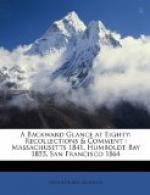Among the motley argonauts were a goodly number of New Englanders, especially from Boston and Maine. Naturally some of them were Unitarians. It seems striking that so many of them were interested in holding services. They had all left “home” within a year or so, and most of them expected to go back within two years with their respective fortunes. When it was learned that a real Unitarian minister was among them, they arranged for a service. The halls of the period were west of Kearny Street in Sacramento and California. They secured the Athenaeum and gave notice in the Alta California.
It is significant that the day the notice appeared proved to be historical. The steamer “Oregon” was due, and it was hoped she would bring the news of favorable action by Congress on the application of California to be admitted into the Union. When in the early forenoon the steamer, profusely decorated with bunting, rounded Clark’s Point assurance was given, and by the time she landed at Commercial and Drumm the town was wild with excitement.
[Illustration: THOMAS STARR KING. SAN FRANCISCO, 1860-1864]
Eastern papers sold readily at a dollar a copy. All day and night impromptu celebrations continued. Unnumbered silk hats (commonly worn by professional men and leading merchants) were demolished and champagne flowed freely. It should be remembered that thirty-nine days had elapsed since the actual admission, but none here had known it.
The Pilgrim Yankees must have felt like going to church now that California was a part of the Union and that another free state had been born. At any rate, the service conducted by Rev. Charles A. Farley was voted a great success. One man had brought a service-book and another a hymnbook. Four of the audience volunteered to lead the singing, while another played an accompaniment on the violin. After the services twenty-five men remained to talk things over, and arranged to continue services from week to week. On November 17, 1850, “The First Unitarian Church of San Francisco” was organized, Captain Frederick W. Macondray being made the first Moderator.
Mr. Farley returned to New England in April, 1851, and services were suspended. Then occurred two very serious fires, disorganizing conditions and compelling postponement. It was more than a year before an attempt was made to call another minister.




